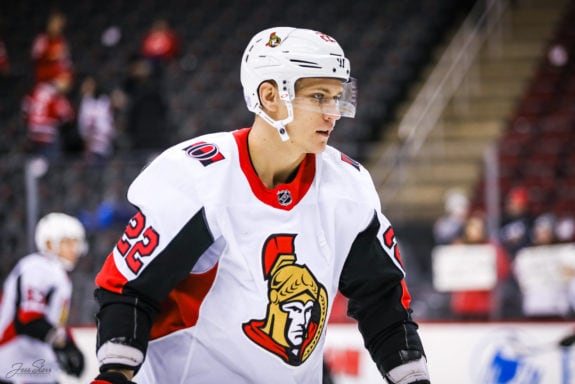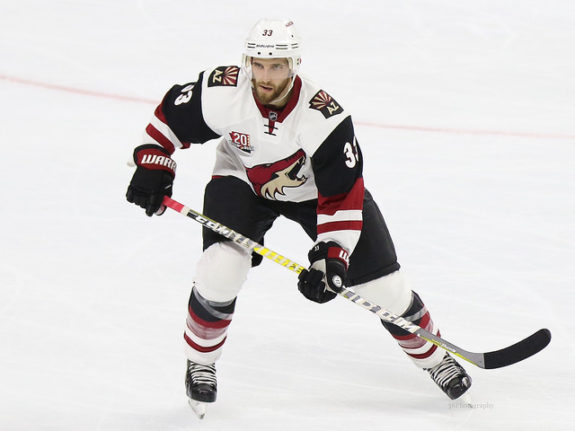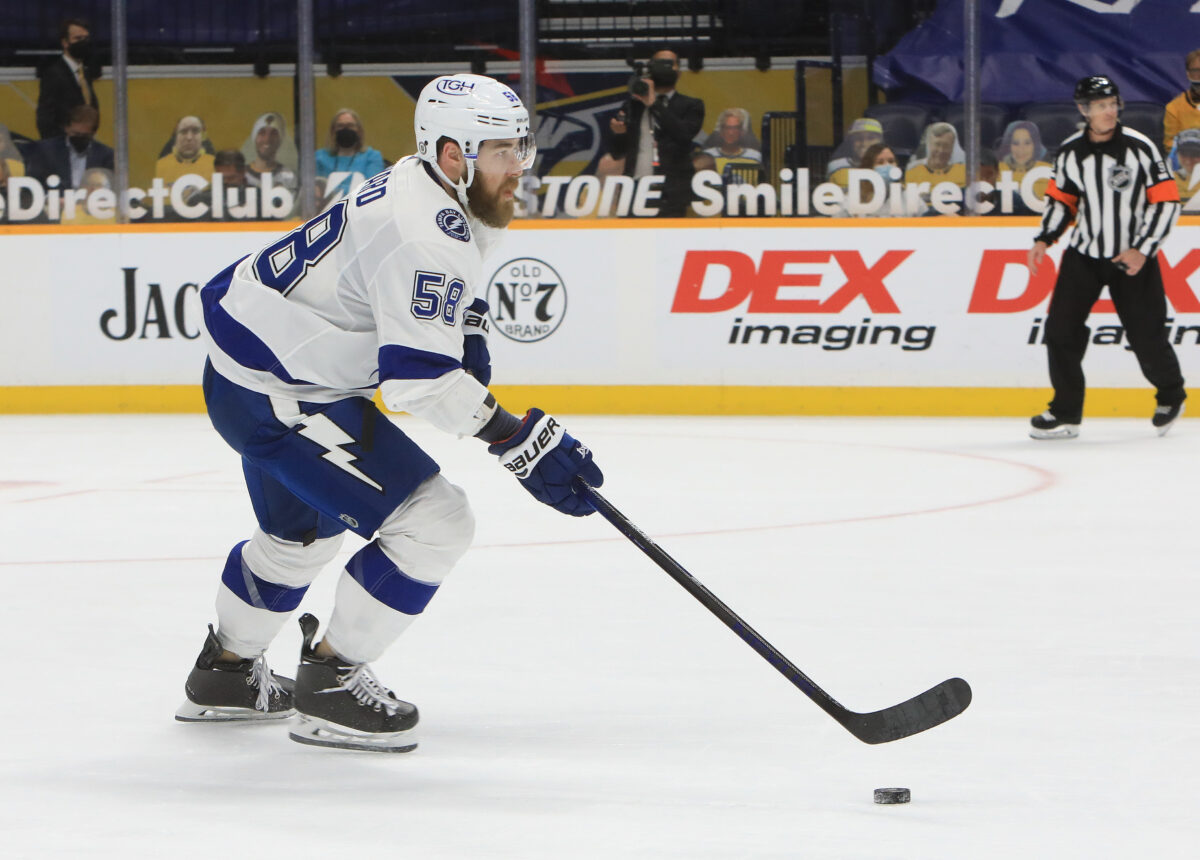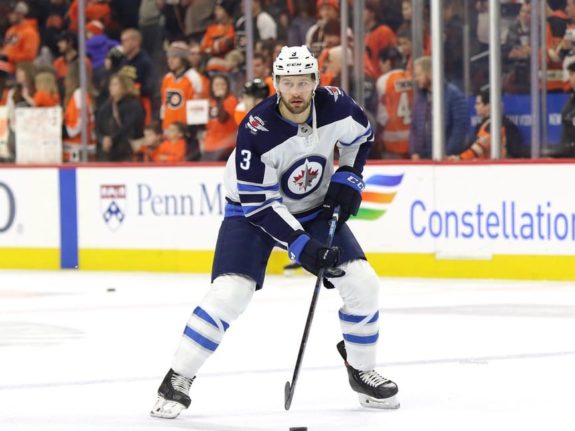If Ottawa Senators owner Eugene Melnyk has his way, then the organization will acquire a “good defensive defenseman” this offseason (as Melnyk discussed on episode 147 of The Bob McCown Podcast from May 19, 2021). A good defensive defenseman could move into the lineup in a few spots, but if we narrow it down based on the fact that they have already invested time and money into Thomas Chabot as their star offensive defenseman, have Erik Brännström on an entry-level contract for one more season as their second offensive defenseman, and re-signed Artem Zub as their defensive presence with some offensive upside on the second pair, it leads me to believe that Melnyk wants a replacement for Nikita Zaitsev on the right side of the top pair. However, finding a replacement for Zaitsev might not be as easy as the outspoken owner hopes.
Of course, a trade is always an option and will likely need to happen to move off Zaitsev’s contract before he hits free agency after the 2023-24 season. However, if the Senators are looking at the free agent market first, I’ve broken down the top five realistic options (sure, signing Dougie Hamilton or Tyson Barrie could be great, but that doesn’t solve the defensive defenseman need) after a quick note about the player they might replace.
Zaitsev’s Reality
First, I’ll just say that I don’t necessarily think that the Senators need to move Zaitsev. He had a fairly strong season, putting up his highest point totals with the Senators and the second highest of his career in a shortened season. He averaged the second most minutes on the team at 22:44 time on ice per game played (TOI/GP) and eats up a ton of time on the penalty kill, averaging the second most on the team as well (2:53 shorthanded time on ice per game played).
He skates well and, despite all the variables of the statistic, had a power play goals against per 60 minutes (PP GA/60) average of 7.57 for the season. For comparison, this is the same as Edmonton Oilers’ Darnell Nurse (while Zaitsev played nearly 24 more minutes of shorthanded time on ice over the season at 158:32) and is better than the Toronto Maple Leafs’ Jake Muzzin (7.96 PP GA/60 over 135:36 shorthanded time on ice) and Montréal Canadiens’ Joel Edmunson (8.03 PP GA/60 over 126:59 shorthanded time on ice) and Shea Weber (9.56 PP GA/60 over 138:06 shorthanded time on ice).

I also understand moving off Zaitsev’s contract could be smart before a hopefully unlikely and undesirable possibility sets in where his overall play drops and he costs $4.5 million against the cap to play third pair or worse. That could be an unfortunate situation for him. His contract for the next three seasons and his bump over the hump of 30 years of age (he turns 30 in October), might force general manager Pierre Dorion’s hand if he doesn’t want to risk the undesirable scenario outlined above. Either way, he’ll have to take a risk: hope that Zaitsev maintains his play and can hold up defensively while Chabot matures as well or bring in a new face to play with Chabot for the next couple of seasons on a potentially less expensive contract and cap hit. If they decide to move Zaitsev out, here are the top five free agent options.
5. Travis Hamonic
Hamonic is on this list, but if you were to argue that he’s an unrealistic option, I wouldn’t push back too hard (I added some bonus picks to make up for it). He’s stated multiple times that he only wants to play in western Canada but, just as a side note, is his hometown of St. Malo, Manitoba, closer to Ottawa or Vancouver? However, the dream is that, just like we’ve seen him settle in with Quinn Hughes on the Vancouver Canucks’ second pair, I’m sure he could settle in quite nicely with Chabot and be the strong defensive presence on the top pair.
He averaged 19:22 time on ice and 1:59 shorthanded time on ice, so there wouldn’t be too much to worry about in terms of taking on top-line minutes. He signed what seems like a steal of a deal at $1.25 million with the Canucks for one year. If the Senators can put together a nicer package closer to his previous contract around $3.5 million per season and talk up his playing alongside Chabot while leading the young and promising defensive group, perhaps they can bring him over to the Senators.
Unfortunately, it sounds like Hamonic enjoys playing for the Canucks and is hoping to reach an extension with the team. (From ‘Canucks’ Travis Hamonic in trade-deadline buzz, but blueliner wants to stay put’, The Province, 3/16/21) He’d be higher on this list if it wasn’t for the location preference, but there is life beyond hockey that affects these decisions, so you can’t blame him.
4. Erik Gudbranson
Yes, the first time through this experiment it didn’t work so well. But there’s no denying that Gudbranson plays with a lot of heart and loves playing for his hometown team. He would come at a great discount and could be a great mentor to Jacob Bernard-Docker, Victor Mete, and Zub. He’s still only 29 years old and would likely play on the third pair and eat up minutes on the penalty kill as he did with the Senators early in 2020-21. He would also likely be part of a rotating group of players who could slot into the third-pair right side, so it doesn’t solve the top-pair defensive defenseman desire, but it provides the Senators with some experienced depth and gives Chabot and Zaitsev another season to come together as a strong top pair.
3. Alex Goligoski
The veteran members of the Arizona Coyotes’ defense group are all unrestricted free agents and are all over the 30-years-old bump. That’s not necessarily “old” for veteran defenseman, but this would only be a one- or two-year contract. Goligoski is the oldest of the group at 35 and will be 36 come training camp, but he played all 56 games with the Coyotes and logged 23:00 average time on ice, something the Senators would want out of their acquisition. He also plays a ton of minutes shorthanded (averaging 2:56 shorthanded time on ice) and would cover every element that you’d miss from Zaitsev’s game on a potentially less-expensive deal.

To get Goligoski and his Cup-winning experience (2009 Pittsburgh Penguins) to come to Ottawa, he still might command $3-4 million per year on a one- or two-year deal. The salary cap pinch has changed possibilities for veteran players looking to add another year or two to the end of their careers, so the Senators may be able to offer less, but every team still wants to fill in their rosters with these players, so they are certainly still valuable and will push for an appropriate salary.
Alternatively, Niklas Hjalmarsson or Jason Demers are also free agents after some time with the Coyotes and one of the two could be an option if Goligoski isn’t available. They are a year or two younger than Goligoski, but only averaged around 17:00 time on ice. You’d want a bit more out of them if you are the Senators, so you’d need to conduct an honest assessment concerning their potential as a top-pair shutdown defenseman at this stage of their careers. Nevertheless, Hjalmarsson has the experience of three Stanley Cup-winning runs, which would be great to have, and Demers could come at a discount to play closer to home (Dorval, Quebec).
2. Brandon Montour
I almost had Brandon Montour at number one, but he isn’t a purely defensive defenseman, so Melnyk might not approve. However, at 27 years old, he would bring five years of NHL experience to the group and be worthy of a three-to-four-year investment. He could continue to grow with the rest of the team and would be a trusted player on the back end. He averaged 20:29 time on ice between the Buffalo Sabres and Florida Panthers in 2020-21 and averaged about 1:40 shorthanded time on ice for the season. He’s got an offensive side, but his offensive play (18 points over 50 games this season) doesn’t come at the deep expensive of defensive structure like it might for a younger defenseman.
Certainly, he’s still maturing, and mistakes can come along the way, but giving more responsibility can help an energy player like Montour elevate their play. He is quick on his feet and can read the play well. This means he could cover Chabot efficiently, but move the puck well on his own, too. He also plays a heavier a game than most of the defensive group on the Senators.
The difficult part for Dorion and company is that he might command a similar price as Zaitsev, if not more. He might be the most expensive option on the list, but he’s also the youngest. Further, the payout could be worth the fact that you’d be investing in a player who is arguably entering their prime as you hope the young core of the Senators start to come together and continue to build on the strong run that ended the 2020-21 season. There’s a chance Montour gives the Senators a small break in order to come back to his home province, but there’s no reason the Sens shouldn’t pay him his full value if they are willing to invest in him.
1. David Savard
Savard gets the top spot on this list because he’s a little bit younger than the Coyotes crew (will be 31 in October) and a heavier presence on the top pair than nearly any other option on this list or Zaitsev. At 6-foot-2 and 233 pounds, he is the archetypal big defensive defenseman from past eras of the NHL. The defensive depth in Tampa Bay is quite strong and their cap crunch is known across the league, so he’ll likely be on his way out as a postseason rental. Perhaps he’ll want to go back to the Columbus Blue Jackets after spending 10 seasons there, but he could also be lured north of the border to a spot closer to home (St. Hyacinthe, Quebec).

Savard plays a hard game and is not on the ice to put up points. He averaged around 20 minutes of time on ice between the Blue Jackets and Lightning this season. He also averaged around two minutes of shorthanded time on ice between the two teams. He’d be unlike any other defenseman on the Senators’ roster and could be the presence needed to help calm the group when things get chaotic or difficult on the back end. He certainly won’t come any less expensive than Zaitsev, however. He could command a similar cap hit at around $.4.5 million, but may try to get more if he can.
Potential Free Agent Value Deals
1. Cody Ceci
That’s right. While you were watching nothing but Scotia North Division games this season, Cody Ceci was having a bounce back run with the Pittsburgh Penguins. Sure, the Penguins are a perennial playoff contender and someone might get a Sidney Crosby boost just by being in the same dressing room, but Ceci could return to his hometown team and be the defensive defenseman of the top pair after gaining a few more seasons of experience elsewhere. He might not want to return to the Senators, but he’d come at a great price (less than $2 million?) and happened to put up the exact same numbers as Zaitsev (four goals and 13 assists for 17 points) this season, averaging 18:31 of time on ice. He may also play best on the second pair, but if you want a less expensive Zaitsev to open more cap space for other players, Ceci is an option.
2. Tucker Poolman
Poolman finished the 2020-21 season on the top pair of the Winnipeg Jets’ defense after an injury to Dylan Demelo. Poolman is only 28 and could be signed to a two- to three-year deal if Dorion and Smith want to invest in him as a defensive presence. Over 39 games this season, he averaged just over 18 minutes of time on ice and about 1:19 of shorthanded time on ice. He’s naturally a better second- or third-pair player, but having him in the mix will add to the depth and put pressure on the rest of the right side to play to their best. Zaitsev would stay in the picture in this case and be given a vote of confidence. Poolman would also come at one of the best deals on this list at maybe a $1.5 million cap hit at most.

There are a few different options available ranging from potentially expensive to less expensive options if the Senators feel the need to replace Zaitsev. As I mentioned above, I don’t think it’s necessary, but it’s understandable if they choose to free up some money now and for the next three seasons. But, don’t forget, a top-pair, right-side defenseman costs money. If you have another free agent defensive defenseman in mind, let me know in the comments below.